During the University of Tennessee’s inaugural Global Engagement Summit on Thursday, April 11th, 2024 the Center for Global Engagement (CGE) will be celebrating the recipients of the McClure Scholarship and Mae Scheib Scholarship for International Research for the 2023-2024 academic year.
Both scholarships are awarded to students to support international independent research. The W. K. McClure Scholarship Program awards full-time undergraduate or graduate students at the University of Tennessee, Knoxville with financial awards up to $5,000. The scholarship can be applied to research and creative projects and aims to enhance the development of knowledge surrounding significant international issues. The Mae Scheib Scholarship also awards $5,000 to undergraduate or graduate students to support international research or creative work abroad.
This year, CGE selected a total of seven McClure and Mae Scheib Scholars from three different colleges across campus. The colleges represented are the College of Arts and Sciences, the Tickle College of Engineering, and the College of Education, Health, Human Sciences.
Read further to learn more about each scholar and the global impact they expect their research to have.
Mae Scheib Scholars
Kaitlin Simpson
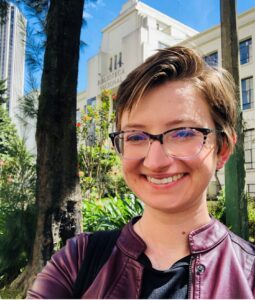
Me, Kaitlin Simpson, in front of the Biblioteca Nacional de Colombia where I collected records and newspaper articles on the growth and expansion of the Colombian cut flower industry.
What is the title of your research project?
“The Flowers of El Dorado: Gender, Production, and the Cut Flower Industry in Colombia and the United States”
What global impact do you expect your research to have?
I hope that my research on the intertwined histories of the U.S. and Colombian cut flower industries will help to bring greater awareness to the global cut flower industry and encourage U.S. consumers to think more critically about where our flowers come from, the labor that went in to producing the beautiful bouquets we love, and how we can consume these flowers ethically and sustainably.
Why is international education important to you?
International education is important to me because traveling and studying abroad in Europe and Latin America has been so integral in shaping my subsequent scholarly endeavors and research on the United States and its historical relationship with the rest of the world. But perhaps more importantly, international education has encouraged me to think about myself not just as a citizen of the United States but as a citizen in service to a wider global community.
What is a fun fact about you?
I spent about two months in high school teaching myself how to juggle and now juggle whenever I get writer’s block.
Marissa Mckeague

Experiencing a traditional Swedish Breakfast in Uppsala, Sweden
What is the title of your research project?
“A World of Difference: A Case Study of the Lived Experiences of Undergraduate Students on a Food and Agricultural Study Abroad Program”
What global impact do you expect your research to have?
The expected impact lies in contributing valuable insights to nutrition education, policies, and practices, fostering healthier eating habits, and promoting cultural understanding across diverse communities. The findings can influence future program development, enhance global nutrition knowledge, and contribute to the discourse on sustainable food choices.
Why is international education important to you?
From a nutrition perspective, international education allows me to delve into traditional diets, food culture, and dietary patterns specific to each region. This firsthand experience gained through interactions with local communities and food producers is invaluable for comprehending the complexities of nutrition on a global scale. It enhances my ability to navigate diverse food landscapes, understand the cultural factors influencing dietary choices, and contribute meaningful insights to developing effective nutrition education programs. International education broadens my perspective as a nutrition researcher, enabling me to address global nutrition challenges and promote healthier eating habits across different cultural contexts.
What is a fun fact about you?
I have a garden and love growing different types of fruit trees, herbs, and vegetables.
McClure Scholars
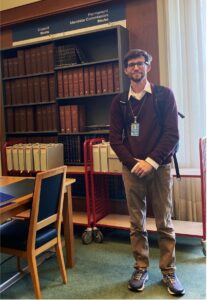
Matthew in front of his research material at the United Nations Archival Reading Room in Geneva, Switzerland.
Matthew Kelley
What is the title of your research project?
“German Agitation in Swiss Civil Society during the Great War”
What global impact do you expect your research to have?
My research investigates how Imperial Germany agitated within neutral Switzerland during the First World War to achieve its wartime goals and needs. Though Switzerland was officially neutral, Germany was able to circumvent the state and interact with the Swiss population through civic associations in its civil society. Civic associations provide the means through which individuals and states interacted on a transnational level. With this, I aim to demonstrate from a historical perspective how neutral countries and their citizens are not detached from global events during times of international crisis. Understanding this dynamic is particularly important in our current geopolitical situation with the Russian-Ukraine War, where the Western states are forced to balance an officially non-belligerent states with a desire to provide aid to Ukraine.
Why is international education important to you?
I believe it is through international education that we develop an understanding of how we as individuals are interconnected with global affairs. Our everyday lives are influenced by worldwide events, but international education also shows how we are active participants in shaping the world around us.
What is a fun fact about you?
I am an avid gardener with a self-proclaimed green thumb. I grew up on a farm in Eastern Kentucky and helped run a floricultural company for a few years between my undergraduate and graduate schooling.
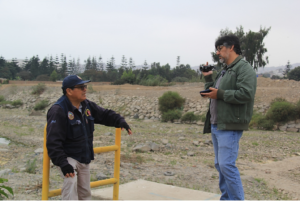
Abel Traslaviña-Arias (right) interviewing Mr. Filomeno García (left), operator of the “Junta de Usuarios del Sector Hidráulico Lurin” (Lurin Hydraulic Sector Users Board), about the Lurin User Commission infrastructure right next to the Lurin riverbed during the dry season (Lima-Peru, July 2023).
Abel Traslaviña-Arias
What is the title of your research project?
“Mapping infrastructural inequalities: A perspective from the potential tensions between community, governmental level, and private infrastructure in lower Lurín valley, Lima-Peru”
What global impact do you expect your research to have?
Unequal access to resources is a common concern at a global level, with local particularities from which it is urgent to learn. It is even more imperative if that resource is as essential for life as water. My research examines how a rural irrigation organization still works despite corporate and public developmental pressures, expressed as infrastructure, to expand the urban activities of Peru’s capital city, Lima, in a region where scarcity reigns. My research will be impactful by informing both the public and researchers interested in Water Justice and sustainability not only to manage such a vital resource but also its scarcity.
Why is international education important to you?
International education is critical to facing common issues that transcend borders. There is no possible solution that comes from an isolated perspective. International education sets a more diverse and compromised discussion that will enrich our resource policies despite our country of origin. Thus, we can learn from the local responses to solve global problems.
What is a fun fact about you?
During my childhood, I had different pets, like chickens, ducks, dogs, cats, and parrots, but not at the same time. When I graduated as an archaeologist in Peru, fieldwork and research drove me away from home to the point I could not have a pet anymore. Now, I am a doctoral student at the Geography and Sustainability Department at the University of Tennessee, Knoxville, and my research requires me to be away. I still love animals, and even when my life pace doesn’t allow me to have a pet with me, I am always down to give some love to my friends’ pets.
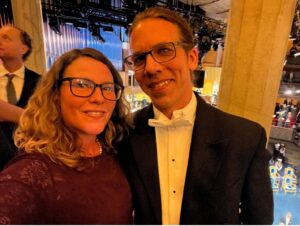
My husband and I were invited to attend the Nobel Prize ceremony in Stockholm.
Jennifer Shaneberger
What is the title of your research project?
“Political rhetoric and labor market integration in Sweden”
What global impact do you expect your research to have?
My research investigates the relationship between political rhetoric and migrant labor market integration. I theorize that the way politicians talk about migrants influences citizens’ attitudes and behaviors toward them. If migrants are framed as threat to security and national identity, this triggers a response in citizens to be guarded and less welcoming, which inhibits integration. My research looks at European Union countries, and I am currently in Sweden conducting interviews with politicians, migrants, citizens, and business representatives. Hopefully, a few chapters from my dissertation will be published in journals like Comparative Migration Studies and those publications can inform politicians who aim to have inclusive labor markets. Perhaps, the research will add some accountability, so that politicians begin to see how the language they choose shapes the outcome.
Why is international education important to you?

I’ve had to shovel my Swedish driveway many times this season, but I’m originally from Michigan and have missed the snow during my studies at UT, so no complaints.
I am a global citizen, not just a member of a singular nation. For me, to be a responsible global citizen requires learning from other ethnic groups and cultures. In my undergraduate work, I studied aboard for nine months in Morocco. Now, for my dissertation, with the help of the McClure and Fulbright fellowships, I am working with Linkoping University here in Sweden. Morocco and Sweden couldn’t be more different from one another, but also from the United States. I hope that over the course of my career, I will be able to experience education from many other cultural lenses.
What is a fun fact about you?
I breed Miniature America Shepherds dogs. To meet people in Sweden before coming, I looked up the club for my breed of dogs. I found a breeder here whose dog was related to my own! I transported a puppy for her from the US to enhance the bloodlines of the breed here in Sweden. We both practice responsible breeding, which requires testing the dogs’ hips, elbows, eyes, and genetics to ensure they are of the best quality with no genetic disorders. My love of this breed has really helped me to meet people in Sweden that I would not have access to otherwise.
Saurav Parajuli
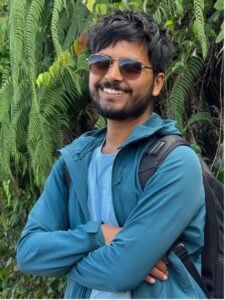
Saurav during a hike in Shivapuri hills in Kathmandu, Nepal
What is the title of your research project?
”Pedestrian Perceptions of Crash Risk in the Motor Vehicle-Oriented Built Environment of Kathmandu, Nepal”
What global impact do you expect your research to have?
My research introduces an innovative method for evaluating pedestrian safety and comfort through visual surveys. With the help of econometric models, this approach aims to pinpoint key risk factors for pedestrians and suggest strategies to reduce these risks. The outcomes will be instrumental in improving pedestrian environments in Kathmandu and other developing cities globally. Additionally, the methodologies are adaptable for use in developed cities as well.
Why is international education important to you?
In my opinion, international education transcends traditional learning, offering a hands-on approach to understanding diverse cultures and global perspectives. It uniquely combines knowledge with real-world experiences, fostering professional and emotional growth and enhancing problem-solving skills in a global context.
What is a fun fact about you?
My enthusiasm for anime has led me to learn the Japanese language. Initially, I got familiar with sounds through the shows, and later, I attended an international language school.
Lateefa Abel

Image showing the maxillary dentition of an early Spanish Colonial-era individual (~1550-1600CE). Top image shows the dentition before sampling the dental calculus. Bottom image shows the dentition after sampling dental calculus.
What is the title of your research project?
“Oral Microbiomes in Colonial Lambayeque, Peru. A Comparative Study Exploring the effect of structural violence, and diet on oral microbiomes in Spanish Colonial Peru.”
What global impact do you expect your research to have?
Oral disease is a global health issue. According to WHO’s Global Oral Health Status Report 2022, approximately 50% of the global population suffers from some form of oral disease. The oral microbiome comprises bacteria, archaea, fungi, protozoa, and viruses; in concert, the oral microbiome’s components aid in maintaining both our oral and systemic health. Our oral health largely depends on the diversity and balance of the microorganisms that make up our oral microbiome.
Studies have shown that diet and oral hygiene practices affect the balance and diversity of our oral microbiome. Molecular archaeologists like myself, studying human microbiomes are interested in understanding how human oral microbiome organisms have changed over time and space. Human lifeways and nutrition drastically changed during the Neolithic and Industrial revolutions. These changes undoubtedly affected many symbiotic and pathogenic organisms making up the oral microbiome. Ancient oral microbiome diversity can be estimated by molecular analysis of dental calculus, a complex calcified bacterial biofilm of dental plaque, saliva, and gingival crevicular fluid. Dental calculus can also be used to study the evolution of the oral microbiome and related oral health and dietary indicators.
My research focuses on how the human oral microbiome adapted to changes in food and water access imposed by Spanish colonists on the Indigenous peoples of the northern coast of Peru and the resultant health consequences of said adaptation.
Why is international education important to you?
As an anthropology student, I understand that man-made borders do not limit the human experience. As an international student, I’ve learned that international education is a great way to immerse yourself in a different culture and expose yourself to different ways of thinking and doing things.
What is a fun fact about you?
I like to knit stuffed toys.
CONTACT:
Albrianna Jenkins (865-974-3177, ajenki58@utk.edu)